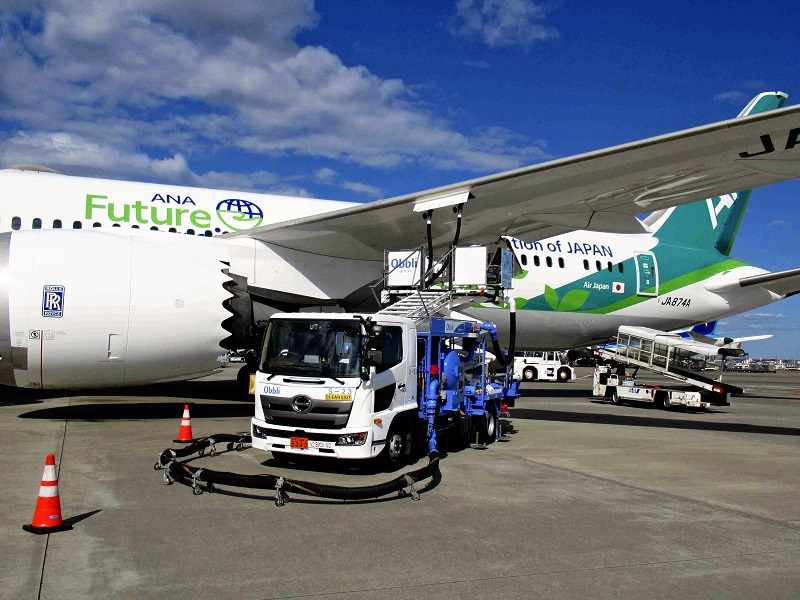
An aircraft is fueled with SAF at Haneda Airport in Tokyo on Monday.
7:00 JST, November 19, 2022
Major real estate firm Mitsubishi Estate Co. and plant operator JGC Holdings Corp. have reached a basic agreement to cooperate in the collection of waste cooking oil for use in producing sustainable aviation fuel (SAF), which has been touted as a means to significantly reduce carbon dioxide emissions, it has been learned.
With the government setting a goal of having domestic production of SAF start by fiscal 2025, it marks an example of how the private sector is also moving into full-scale production and utilization of SAF.
SAF is made from a variety of natural sources, including used cooking oil, household garbage and algae. It is said to reduce CO2 emissions by 60% to 80% compared to jet fuel derived from crude oil. SAF is mixed in with regular jet fuel to produce the final product.
SAF is regarded as a game changer in the effort to decarbonize the aviation sector, but faces the challenge of securing sufficient amounts of waste cooking oil for use as a raw material.
Starting in March 2023, Mitsubishi Estate will serve as an intermediary between restaurants that occupy properties it owns and businesses that collect the used oil. It will then arrange to have the the accumulated oil provided to an SAF plant that JGC Holdings plans to start operating as early as fiscal 2024.
Mitsubishi Estate owns 23 buildings in the Marunouchi area around JR Tokyo Station, and waste cooking oil from the about 350 restaurants and company cafeterias in the properties amounts to about 150 tons per year.
That amount can be refined into about 130 kiloliters of SAF. If this is added to a mixture to reduce the use of regular jet fuel by 10%, it would be enough to fuel 105 round-trips between Tokyo and Osaka.
Mitsubishi Estate plans to expand the scope of the project nationwide from fiscal 2023, even collecting used oil from 10 airports that it has a hand in operating, including Shizuoka Airport and New Chitose Airport in Hokkaido.
The government has established a council of public and private entities, including airlines and oil companies, with the aim of achieving domestic production of SAF. Its set objective is to have SAF account for 10% of domestic airline fuel by 2030.
Top Articles in Business
-

Prudential Life Insurance Plans to Fully Compensate for Damages Caused by Fraudulent Actions Without Waiting for Third-Party Committee Review
-

Narita Airport, Startup in Japan Demonstrate Machine to Compress Clothes for Tourists to Prevent People from Abandoning Suitcases
-

JR Tokai, Shizuoka Pref. Agree on Water Resources for Maglev Train Construction
-

Toyota Motor Group Firm to Sell Clean Energy Greenhouses for Strawberries
-

KDDI Opens AI Data Center at Former Sharp Plant in Osaka Prefecture; Facility Will Provide Google’s Gemini AI Model for Domestic Users
JN ACCESS RANKING
-

Japan Institute to Use Domestic Commercial Optical Lattice Clock to Set Japan Standard Time
-

Japan PM Takaichi’s Cabinet Resigns en Masse
-

Israeli Ambassador to Japan Speaks about Japan’s Role in the Reconstruction of Gaza
-

Man Infected with Measles May Have Come in Contact with Many People in Tokyo, Went to Store, Restaurant Around When Symptoms Emerged
-

Prudential Life Insurance Plans to Fully Compensate for Damages Caused by Fraudulent Actions Without Waiting for Third-Party Committee Review





















